Upcoming Trainings
The ILPPP provides trainings on forensic evaluation and mental health law for mental health professionals, attorneys, judges, and forensic or correctional clinicians. We offer our trainings in a variety of formats, including in-person trainings at UVA, synchronous online trainings, self-paced prerecorded online lectures, and hybrid formats that include both in-person and online components.
These trainings are available to clinicians and legal personnel within and beyond Virginia. Although some trainings are tailored to Virginia law, the vast majority of content is applicable to professionals practicing in any jurisdiction.
Please see listings below for more information about current trainings and to register.
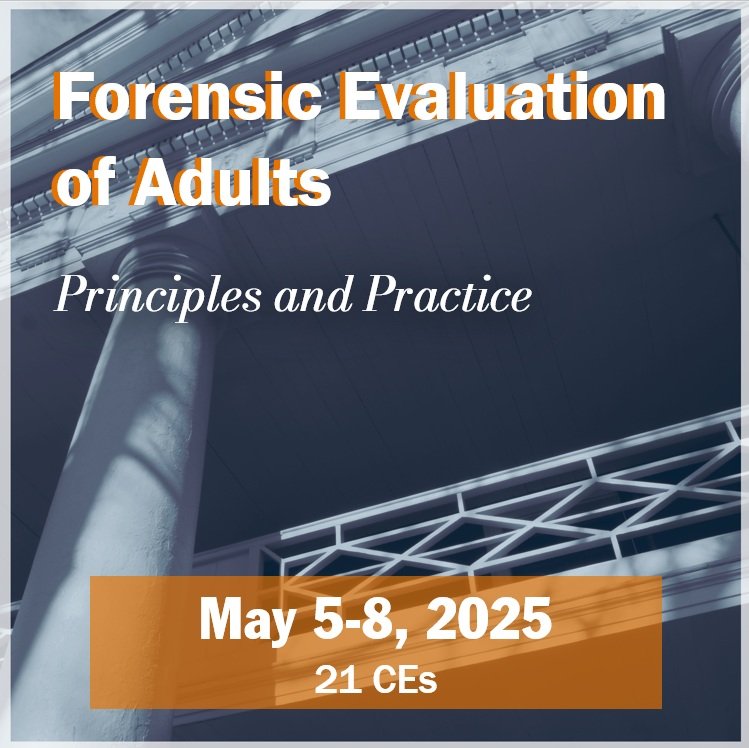
Forensic Evaluation of Adults: Principles and Practice
The ILPPP is conducting its longstanding training on forensic evaluations of adult defendants in a hybrid format. This is a “flipping the classroom” model that combines approximately 12 hours of self-paced online video lectures and quizzes with three days of in-person learning activities at the ILPPP, available before and after the in-person portion. Participants are eligible for up to 21 continuing education units (CEUs) approved by the American Psychological Association (APA). Eligible clinicians who complete this training can be placed on Virginia’s approved list of competency and sanity evaluators.
$1250 Standard Registration
$600 DBHDS/CSB Employees
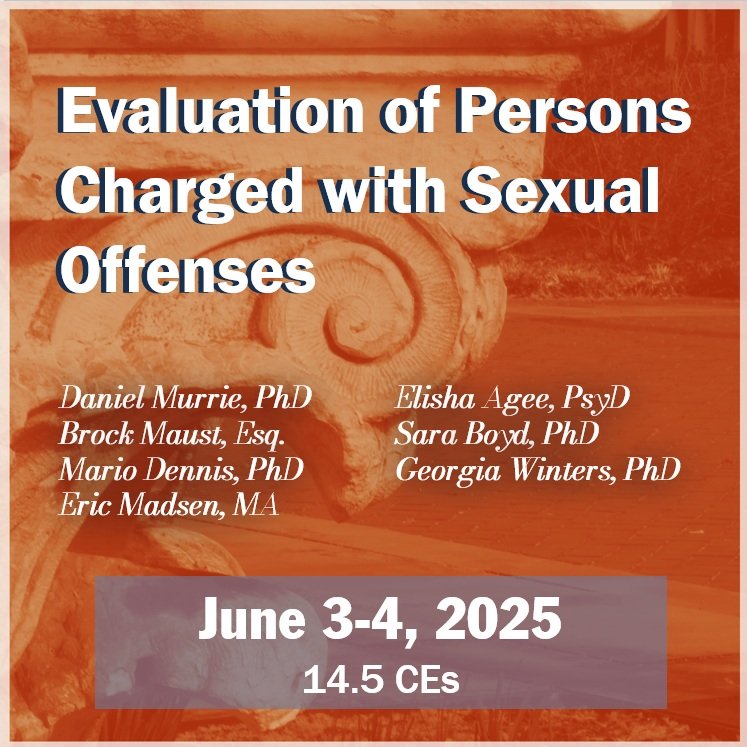
Evaluating Persons Charged with Sexual Offenses
This two-day, live online (virtual) training provides the foundation necessary for mental health professionals to conduct pre-sentencing evaluation of sexual offenders. After an attorney teaches the legal foundations, a team of psychologists address paraphilias, science underlying risk assessment, clinical and risk assessment, victim grooming behaviors, online behavior among sexual offenders, and the Static-99R risk instrument. Psychologists can earn up to 14.5 APA-accredited CEUs.
While the scientific and clinical foundations of this training are applicable to all practice areas, this training is designed to provide the “specialized training” required to be appointed as an expert under Virginia §19.2-300, providing a pre-sentencing evaluation of a “person convicted of an offense indicating sexual abnormality.”
$850 Standard Registration
$425 DBHDS/CSB employees
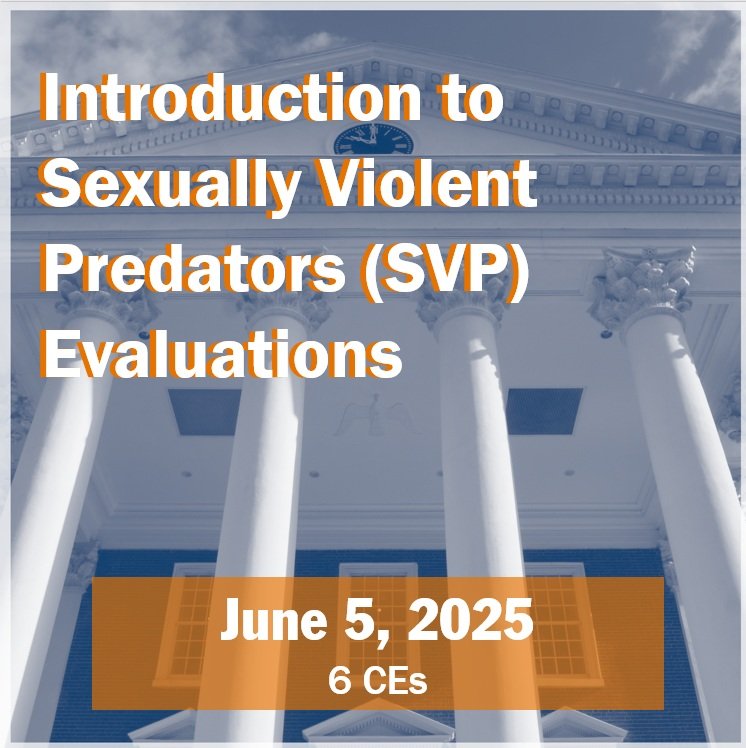
Introduction to Sexually Violent Predator (SVP) Evaluations
Sexually Violent Predator (SVP) evaluations are unique and challenging evaluations that are distinct from other forensic evaluations that may address sexually offending.
In this one-day, live-online (virtual) training, Brock Maust, Esq., will provide a legal introduction to SVP evaluations with an overview of the SVP statute in VA and its relation to other state statutes. Drs. Hastings and King will describe best practices in SVP evaluations, providing crucial information for trainees who want to move from other forensic practice towards this highly specialized niche. Our speakers have extensive experience performing SVP evaluations across state and federal jurisdictions. Participants can earn up to 6 APA-accredited CEUs.
$300 Standard Registration
$150 DBHDS/CSB Employees
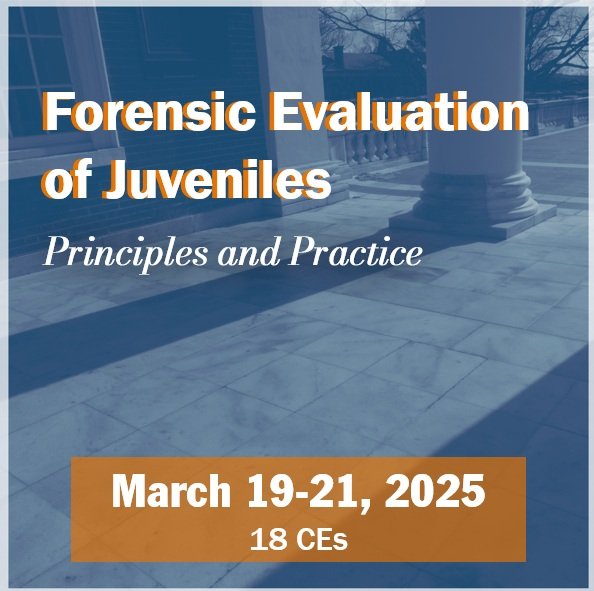
Forensic Evaluation of Juveniles: Principles & Practice
The ILPPP is now conducting its longstanding training on forensic evaluations of juveniles in a hybrid format. This is a “flipping the classroom” model that combines approximately 12 hours of self-paced online video lectures and quizzes with close to three days of in-person learning activities at the ILPPP. Participants can earn up to 18 APA-approved CEUs. Eligible clinicians who complete this training can be placed on Virginia’s approved list of juvenile competency evaluators.
$1125 Standard registration
$550 DBHDS/CSB employees
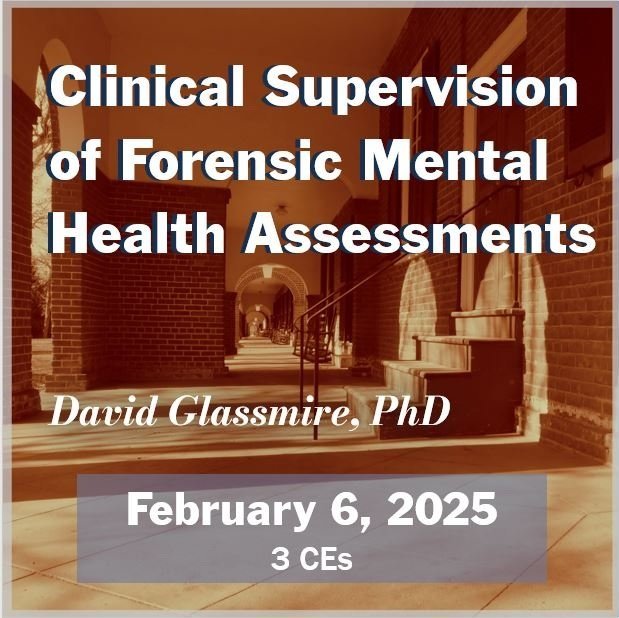
Clinical Supervision of Forensic Mental Health Assessments
Due to the high stakes and adversarial contexts in which forensic mental health assessments (FMHAs) occur, clinical supervision of these evaluations often involves unique challenges above and beyond those encountered when supervising traditional clinical work products. This virtual, three-hour training will outline the core competencies that are expected of forensic practitioners who conduct FMHAs and will cover the process of teaching, modeling, and evaluating forensic competencies when supervising trainee assessments in applied forensic settings. The presentation will also outline a process for integrating core issues into FMHA supervision, including cultural considerations and ethical foundations in forensic psychology. Participants can earn up to 3 APA-approved CEUs.
$150 Standard registration
$75 DBHDS/CSB employees
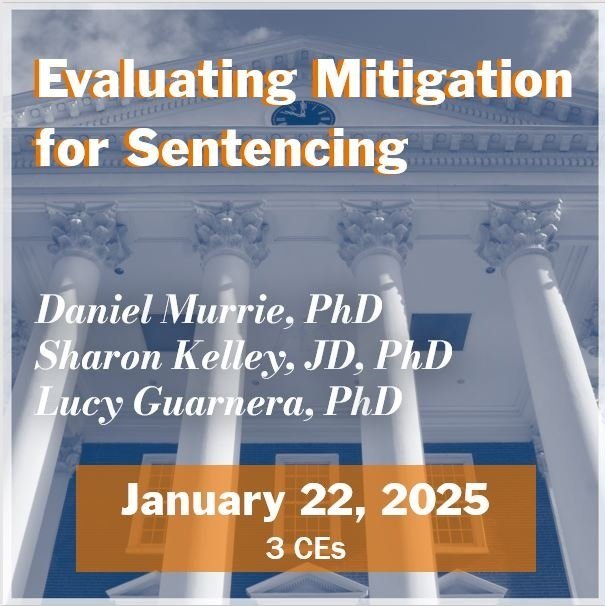
Evaluating Mitigation for Sentencing
While there are clear legal standards and forensic best practices for mitigation in capital cases, attorneys are increasingly requesting mitigation evaluations for non-capital cases as well. This virtual, three-hour training introduces the legal and clinical bases for evaluating mitigation for sentencing. We discuss key court cases and legal frameworks, evaluation parameters, ethical considerations, report-writing strategies, and the focal role of traumatic stress in mitigation evaluations. Participants can earn up to 3 APA-accredited CEUs.
$150 Standard Registration
$75 DBHDS/CSB Employees
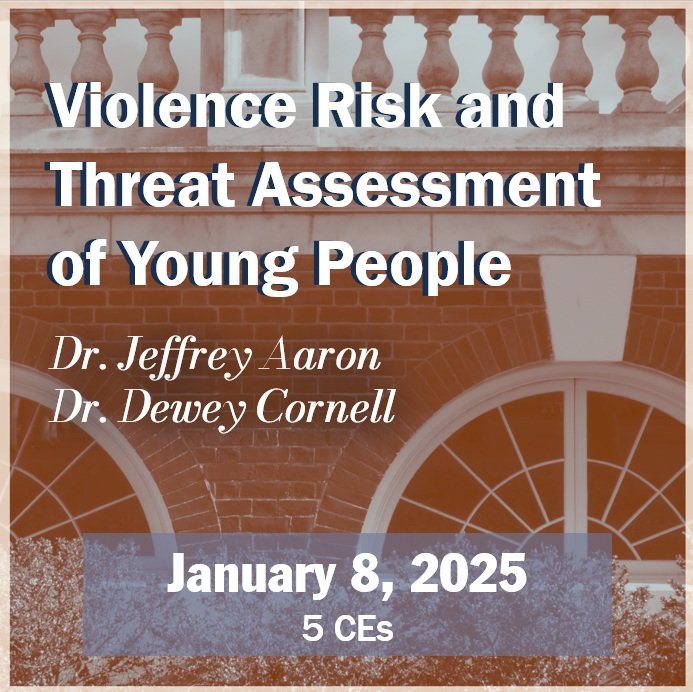
Violence Risk & Threat Assessment of Young People
This one-day, live online (virtual) program provides a comprehensive introduction to current research and best practices of violence risk assessment with juveniles, including student threat assessment in schools. The training includes an introduction to the SAVRY, one of the most commonly used risk assessment instruments for juveniles. This program is well-suited for mental health professionals, juvenile justice staff, social services agencies, educators, and others who encounter questions about young people’s risk for violent behavior. Psychologists can earn up to 5 APA-accredited CEUs.
$250 Standard registration
$125 DBHDS/CSB employees

Forensic Mental Health Assessment (FMHA) in Immigration Court: Clinical Considerations
There is significant opportunity for psychological science and expertise to contribute to the improvement of legal decision-making in the context of immigration proceedings. Many of the legal issues involved in immigration court (IC) decisions include mental health concepts (e.g., fear of persecution, mental abuse, credibility, competency for self-representation). The demand for psychologists to conduct FMHA in IC has increased as the number of immigrants in detention and facing removal (deportation) has also increased. These evaluations require specialized knowledge in the areas of immigration law, forensic assessment, and cross-cultural psychology. This virtual, four-hour training provides a brief review of the context of immigration law and relevant psycholegal issues, as well as practical and cultural considerations for the practice of FMHA in immigration proceedings. Participants can earn up to 4 APA-approved CEUs. [Day 2 of Special Topic: Immigration Trainings]
$95 Registration
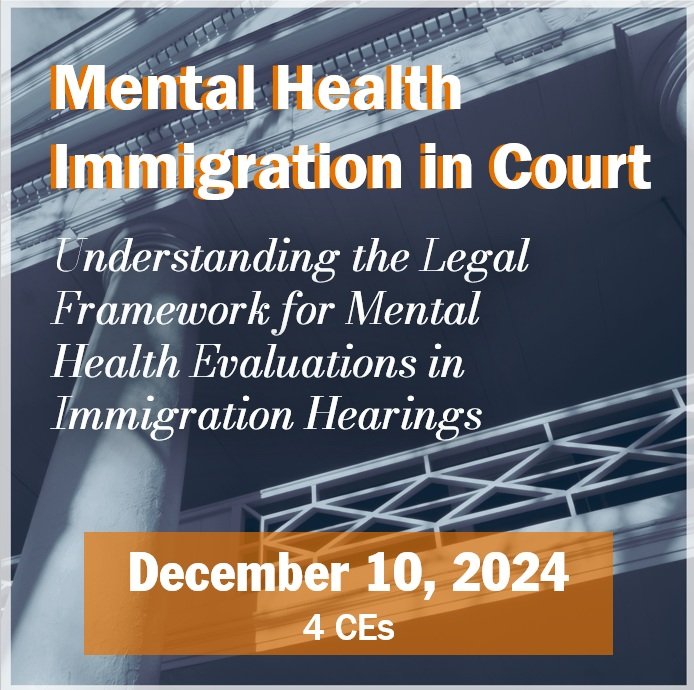
Mental Health in Immigration Court: Understanding the Legal Framework for Mental Health Evaluations in Immigration Hearings
This virtual, four-hour session provides an overview of the ways that a noncitizen’s mental health is at issue during an immigration proceeding in which they face the prospect of deportation from the United States. Presenters from the Amica Center for Immigrant Rights will discuss the concept of competency and procedural safeguards in the context of immigration proceedings, and will provide an overview of how mental health evaluations may be used to support a range of legal claims available to noncitizens, such as applications for asylum and other fear-based protection from removal. The training will also address practical concerns in conducting evaluations for individuals in detention facilities and working with language barriers. Participants can earn up to 4 APA-approved CEUs. [Day 1 of Special Topic: Immigration Trainings]
FREE
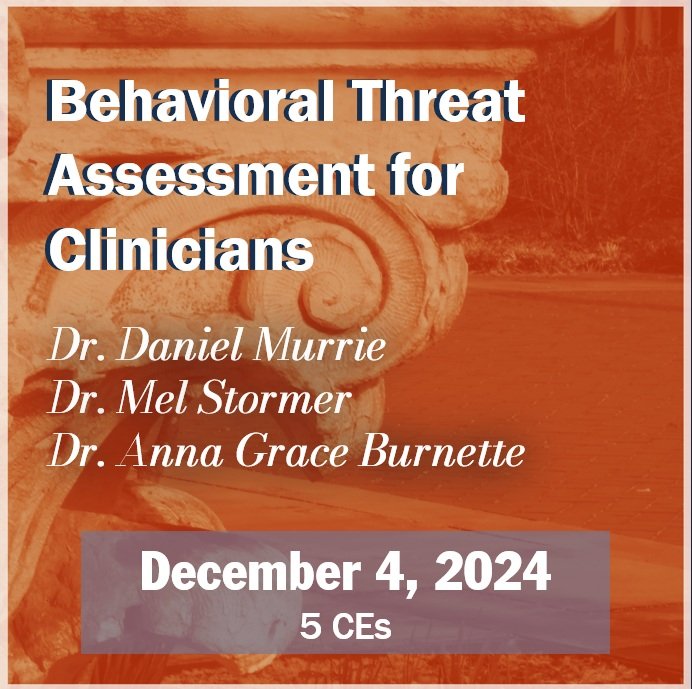
Behavioral Threat Assessment for Clinicians
Clinicians in any treatment context—not just forensic settings—require some basic literacy in behavioral threat assessment. They should be able to explore any concerns about threat assessment that emerge in routine practice, particularly those that might prompt a duty to warn. This virtual, five-hour training presents a primer in behavioral risk assessment in order to begin developing a literacy in these important skills, particularly for clinicians in community clinical practice. Participants can earn up to 5 APA-approved CEUs.
$250 Standard Registration
$125 DBHDS/CSB Employees
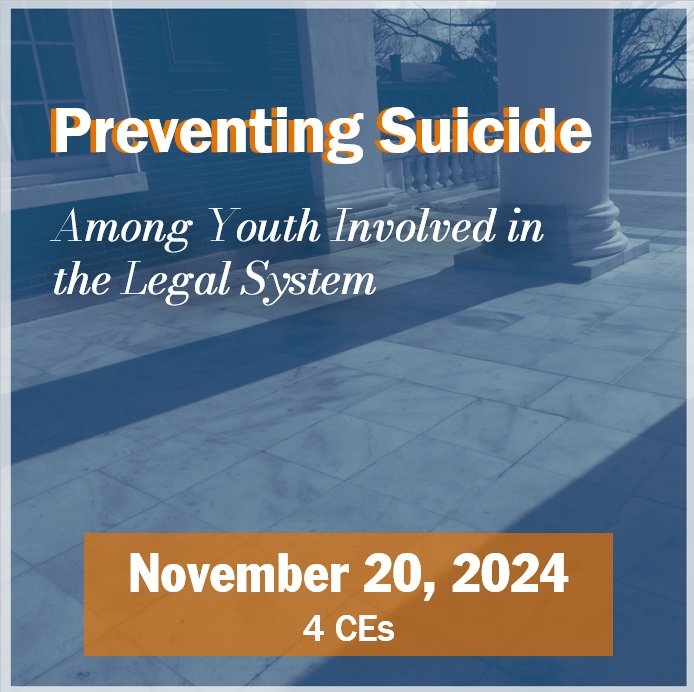
Preventing Suicide Among Youth Involved in the Legal System
Clinicians working with youth need best practice training on suicidal thoughts and behaviors among youth involved in the legal system. This virtual, four-hour training provides the foundational background knowledge as well as discussions on suicide screening among youth at an introductory level. Clinicians will also gain practice skills of brief evidence-based interventions. Participants can earn up to 4 APA-approved CEUs.
$200 Standard Registration
$100 DBHDS/CSB Employees
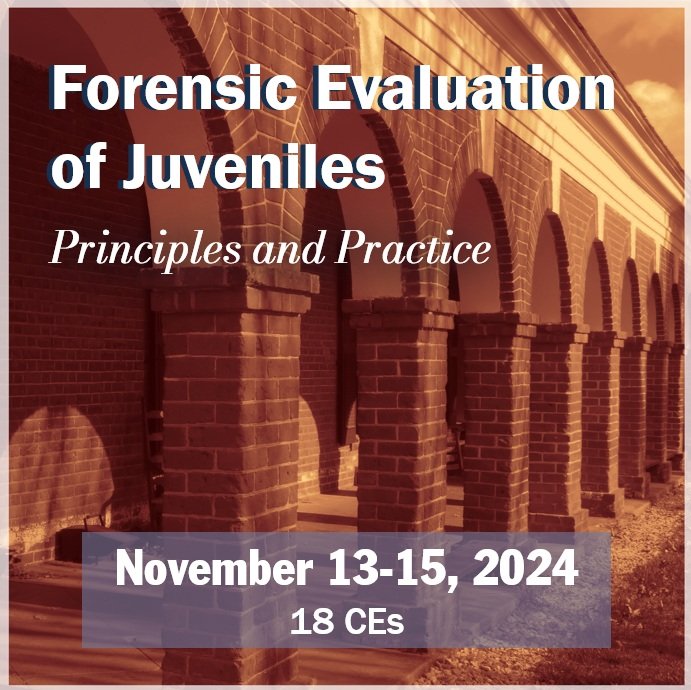
Forensic Evaluation of Juveniles: Principles & Practice
The ILPPP is now conducting its longstanding training on forensic evaluations of juveniles in a hybrid format. This is a “flipping the classroom” model that combines approximately 12 hours of self-paced online video lectures and quizzes with close to three days of in-person learning activities at the ILPPP. Participants can earn up to 18 APA-approved CEUs. Eligible clinicians who complete this training can be placed on Virginia’s approved list of juvenile competency evaluators.
$1125 Standard registration
$550 DBHDS/CSB employees
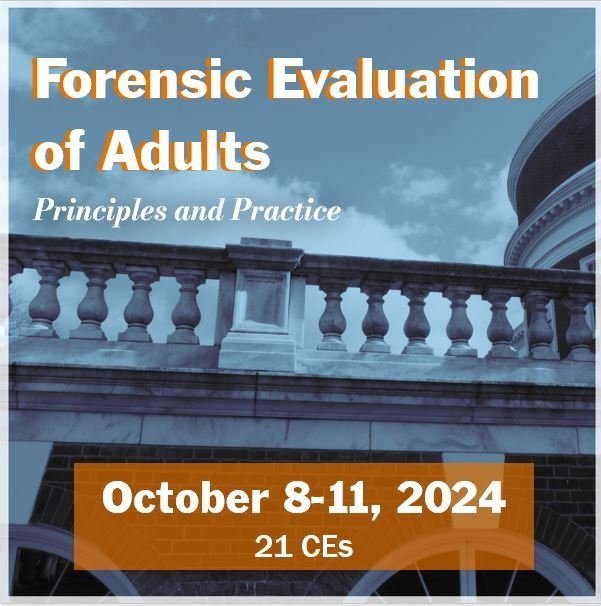
Forensic Evaluation of Adults: Principles and Practice
The ILPPP is conducting its longstanding training on forensic evaluations of adult defendants in a hybrid format. This is a “flipping the classroom” model that combines approximately 12 hours of self-paced online video lectures and quizzes with three days of in-person learning activities at the ILPPP, available before and after the in-person portion. Participants are eligible for up to 21 continuing education units (CEUs) approved by the American Psychological Association (APA). Eligible clinicians who complete this training can be placed on Virginia’s approved list of competency and sanity evaluators.
$1250 Standard Registration
$600 DBHDS/CSB Employees
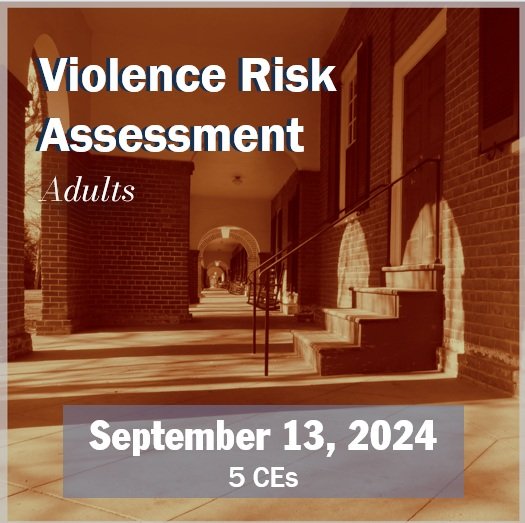
Violence Risk Assessment of Adults
Clinicians, particularly in forensic contexts, are often asked to assess violence risk among criminal defendants, psychiatric patients, and others. This one-day, in-person training addresses the conceptual and scientific bases for risk assessment, covering best practice guidelines and relevant research (particularly addressing violence and mental illness). The program also includes an overview of violence risk assessment instruments, followed by an afternoon session including HCR-20 scoring and case conceptualization. Participants will also apply the HCR-20 to a case example. Psychologists can earn up to 5 APA-accredited CEUs.
$250 Standard registration
$100 DBHDS/CSB employees
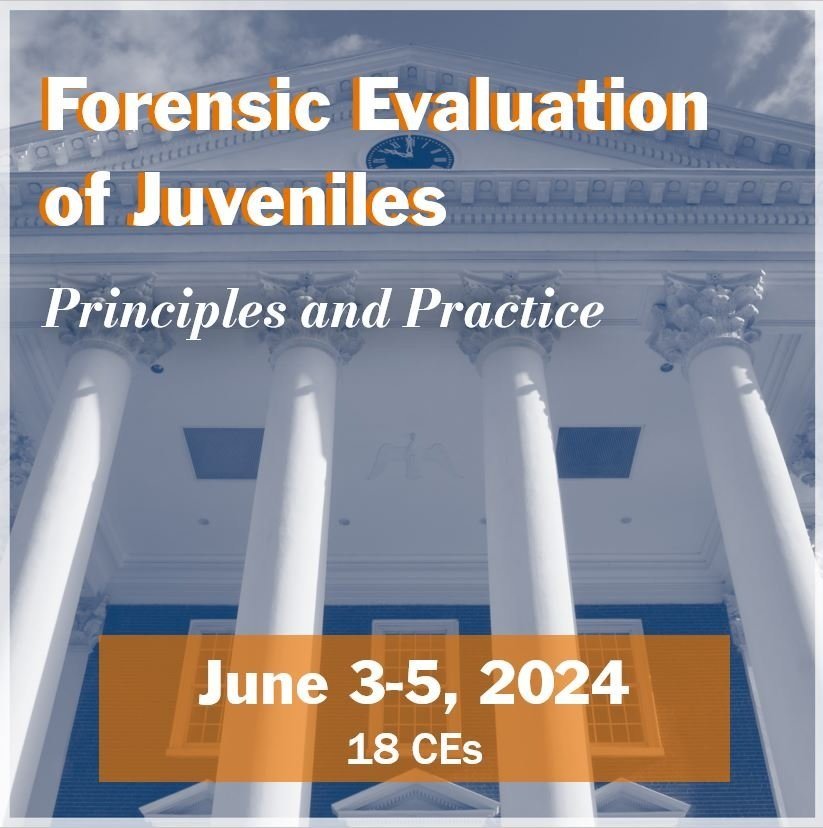
Forensic Evaluation of Juveniles: Principles & Practice
The ILPPP is now conducting its longstanding training on forensic evaluations of juveniles in a hybrid format. This is a “flipping the classroom” model that combines approximately 12 hours of self-paced online video lectures and quizzes with close to three days of in-person learning activities at the ILPPP. Participants can earn up to 18 APA-approved CEUs. Eligible clinicians who complete this training can be placed on Virginia’s approved list of juvenile competency evaluators.
$1125 Standard registration
$550 DBHDS/CSB employees
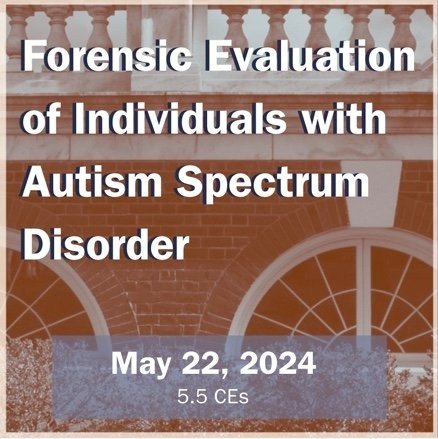
Forensic Evaluation of Individuals with Autism Spectrum Disorders
This one-day, live online training brings together experts on autism spectrum disorder, the lived experience of individuals with autism in the criminal legal system, forensic evaluation of individuals with autism, and risk assessment of individuals with autism. This program begins with a leading academic expert in autism spectrum disorder presenting on the clinical dimensions of autism, with a focus on recent advances in theory and research on legal contexts (Dr. Matthew Lerner). Next, a national trainer of judges, attorneys, police, correctional officers, and other legal personnel presents recommendations for accommodating individuals with autism within the criminal legal system, including potential supports in community and carceral settings (Kate Hooven). In the afternoon, two expert forensic psychologists discuss best practices for forensic evaluation of adolescents and adults with autism in a variety of contexts (Dr. Kaisa Marshall), with a special focus on evaluating risk of violence and sexual offending among this population (Dr. Sara Boyd). Participants can earn up to 5.5 APA-approved CEUs.
$250 Standard registration
$100 DBHDS/CSB employees
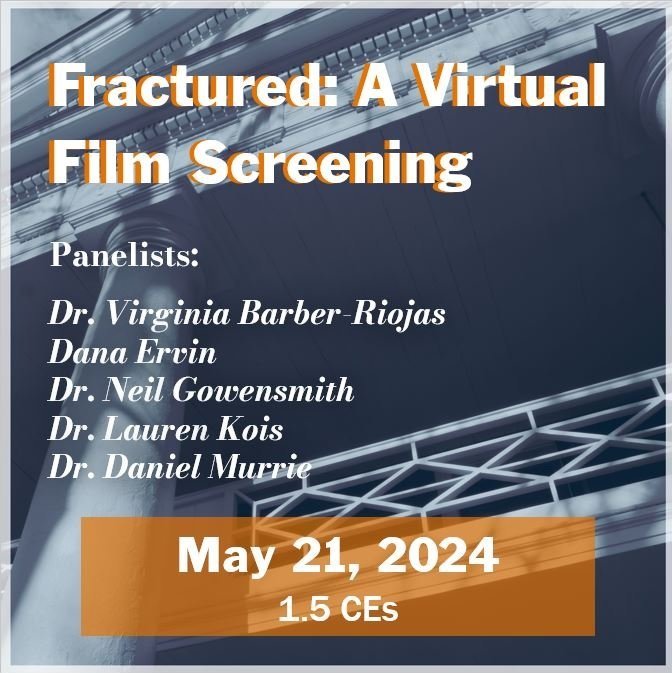
Fractured: A Virtual Film Screening and Discussion on Mental Health and the Criminal Legal System
In recent years, the U.S. has been experiencing what’s been called a mental health crisis. The documentary Fractured examines how that crisis is playing out within the criminal justice system in North Carolina, a state where it’s been harder to access mental health care than in most others. From FRONTLINE’s Local Journalism Initiative, the Charlotte, North Carolina, NPR station WFAE, and Firelight Media, Fractured investigates the long waits for mental health care that defendants who are deemed too sick to stand trial face in North Carolina. The documentary explores how the long waits for care affect not only these defendants, but also the criminal justice system itself. Participants can earn up to 1.5 APA-approved CEUs.
FREE
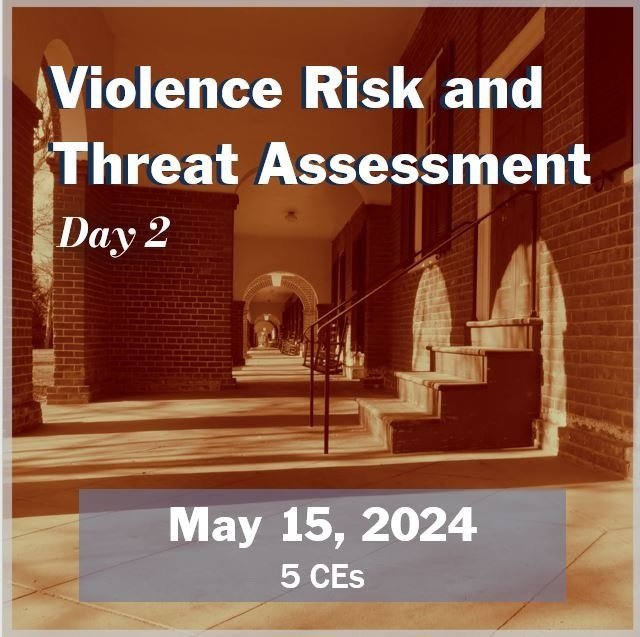
Violence Risk and Threat Assessment (Day 2)
Clinicians, particularly in forensic contexts, are often asked to assess violence risk among criminal defendants, psychiatric patients, and others. This one-day, in-person training addresses the conceptual and scientific bases for risk assessment, covering best practice guidelines and relevant research (particularly addressing violence and mental illness). The program also includes an overview of violence risk assessment instruments, followed by an afternoon session including HCR-20 scoring and case conceptualization. Participants will also apply the HCR-20 to a case example. Psychologists can earn up to 5 APA-accredited CEUs.
$250 Standard registration
$100 DBHDS/CSB employees
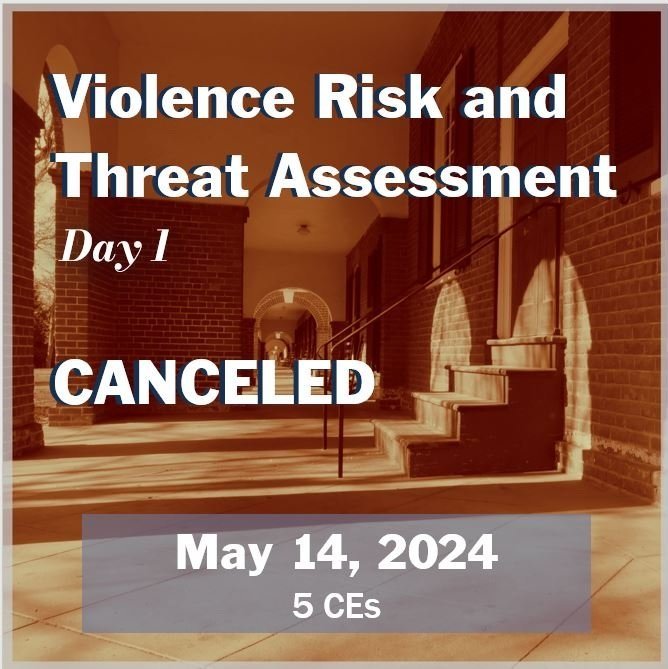
Violence Risk and Threat Assessment (Day 1) CANCELED
Clinicians in any treatment context—not just forensic settings—require some basic literacy in violence risk assessment and threat assessment. They should be able to explore any concerns about violence risk that emerge in routine practice, particularly those that might prompt a duty to warn. This training presents a primer in violence risk assessment and the related discipline of threat assessment in order to begin developing a literacy in these important skills, particularly for clinicians in community clinical practice. Participants can earn up to 5 APA-accredited CEUs.
$250 Standard registration
$100 DBHDS/CSB employees
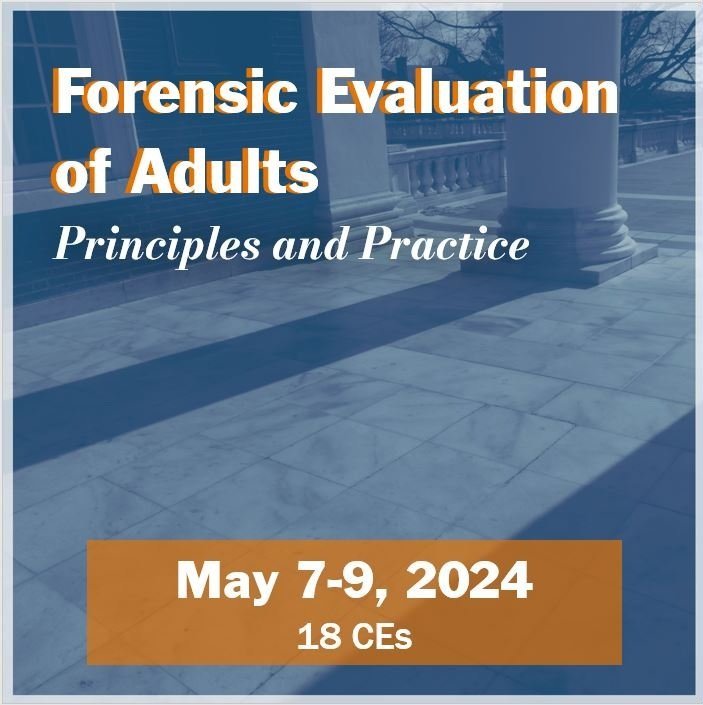
Forensic Evaluation of Adults: Principles and Practice
The ILPPP is conducting its longstanding training on forensic evaluations of adult defendants in a hybrid format. This is a “flipping the classroom” model that combines approximately 12 hours of self-paced online video lectures and quizzes with three days of in-person learning activities at the ILPPP, available before and after the in-person portion. Participants are eligible for up to 18 continuing education units (CEUs) approved by the American Psychological Association (APA). Eligible clinicians who complete this training can be placed on Virginia’s approved list of competency and sanity evaluators.
$1250 Standard Registration
$600 DBHDS/CSB Employees
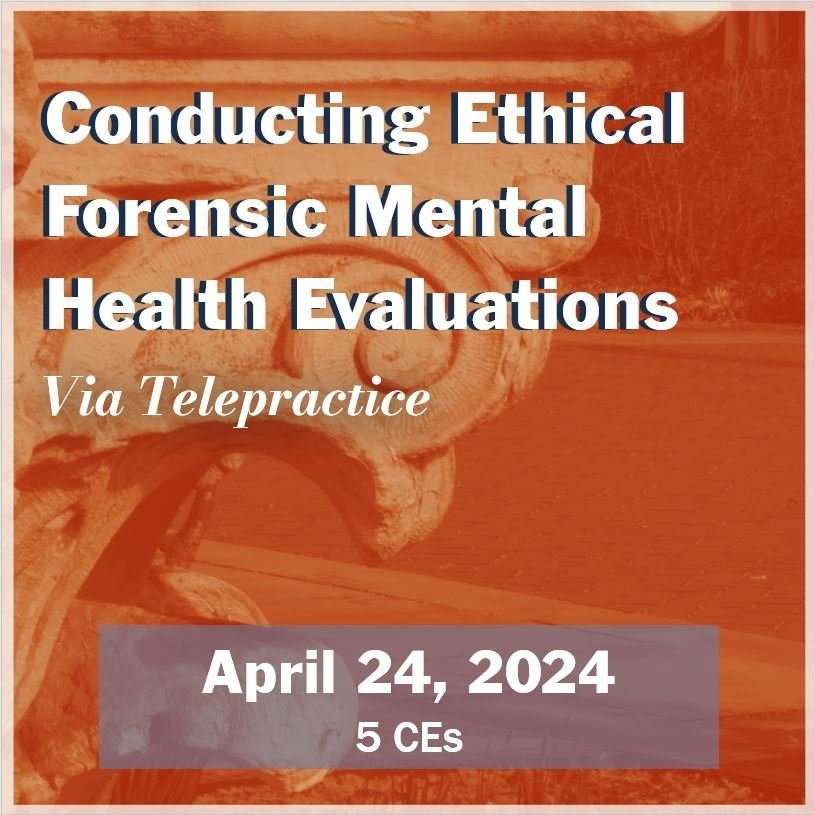
Conducting Ethical Forensic Mental Health Evaluations Via Telepractice
Many forensic evaluators have greater choice in determining whether and how to employ technology in completing evaluations. This workshop will cover the extant research supporting the use of remote evaluation practice. Additionally, we will address issues of ethics and risk management and how to write transparently about remote methods. We will discuss the use and interpretation of remote psychological testing. The presentation will cover the AP-LS (APA Div 41) “Recommendations for the use of telepsychology in practice and research”. Participants can earn up to 5 APA-approved CEUs.
$195 Standard registration
$95 DBHDS/CSB employees
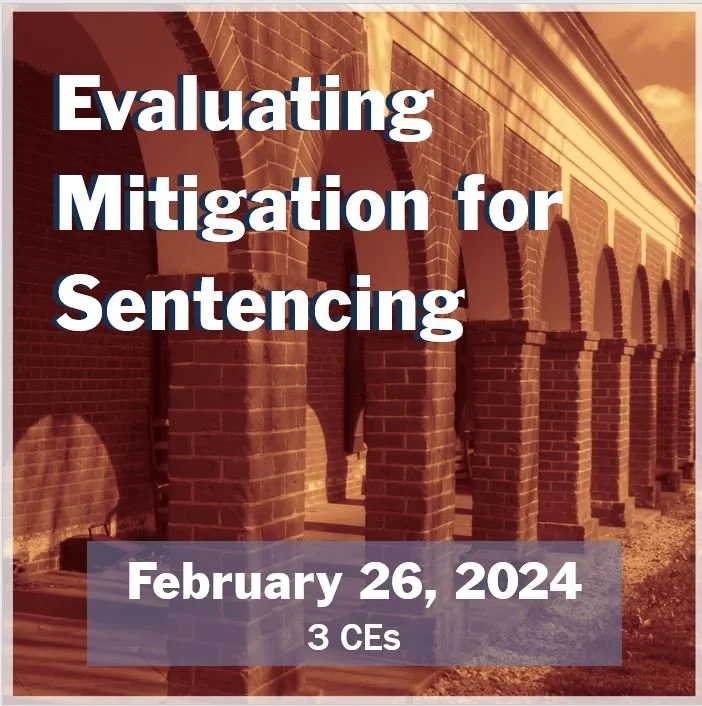
Evaluating Mitigation for Sentencing
While there are clear legal standards and forensic best practices for mitigation in capital cases, attorneys are increasingly requesting mitigation evaluations for non-capital cases as well. This virtual, three-hour training introduces the legal and clinical bases for evaluating mitigation for sentencing. We discuss key court cases and legal frameworks, evaluation parameters, ethical considerations, report-writing strategies, and the focal role of traumatic stress in mitigation evaluations. Participants can earn up to 3 APA-accredited CEUs.

Evaluating People Charged with Sexual Offenses
This two-day, live online (virtual) training provides the foundation necessary for mental health professionals to conduct pre-sentencing evaluation of sexual offenders. After an attorney teaches the legal foundations, a team of psychologists address paraphilias, science underlying risk assessment, clinical and risk assessment, victim grooming behaviors, online behavior among sexual offenders, and the Static-99R risk instrument. Psychologists can earn up to 12 APA-accredited CEUs.
While the scientific and clinical foundations of this training are applicable to all practice areas, this training is designed to provide the “specialized training” required to be appointed as an expert under Virginia §19.2-300, providing a pre-sentencing evaluation of a “person convicted of an offense indicating sexual abnormality.”
$395 Standard registration
$195 DBHDS/CSB employees
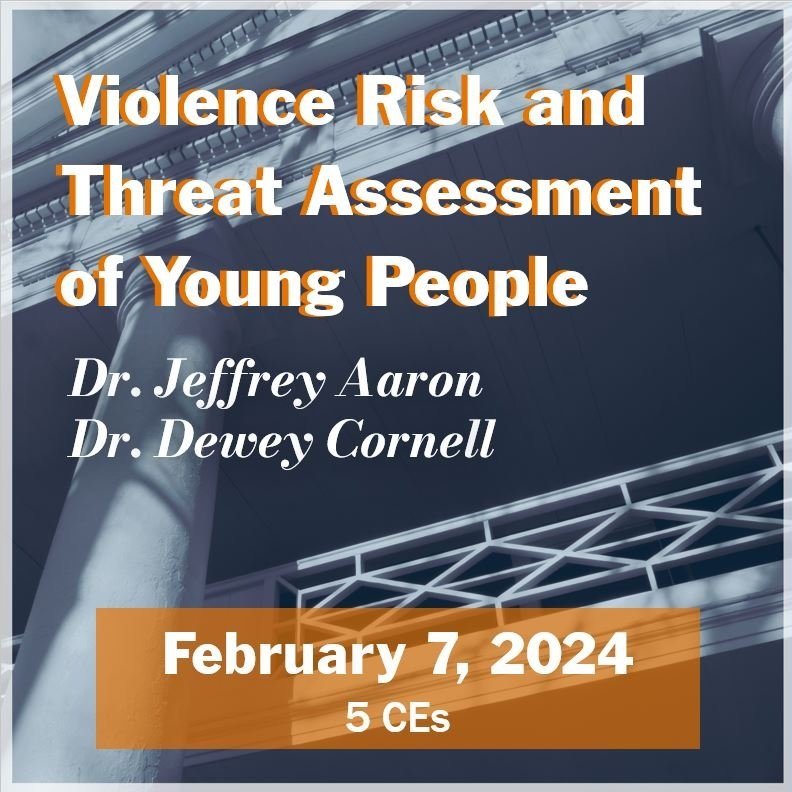
Violence Risk & Threat Assessment of Young People
This one-day, live online (virtual) program provides a comprehensive introduction to current research and best practices of violence risk assessment with juveniles, including student threat assessment in schools. The training includes an introduction to the SAVRY, one of the most commonly used risk assessment instruments for juveniles. This program is well-suited for mental health professionals, juvenile justice staff, social services agencies, educators, and others who encounter questions about young people’s risk for violent behavior. Psychologists can earn up to 5 APA-accredited CEUs.
$225 Standard registration
$95 DBHDS/CSB employees
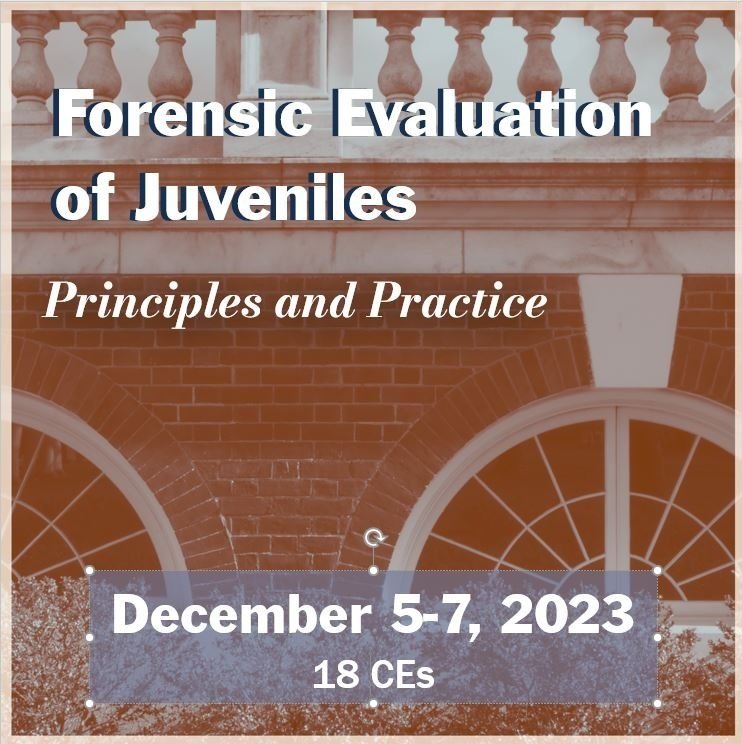
Juvenile Forensic Evaluation: Principles & Practice
The ILPPP is now conducting its longstanding training on forensic evaluations of juveniles in a hybrid format. This is a “flipping the classroom” model that combines approximately 12 hours of self-paced online video lectures and quizzes with close to three days of in-person learning activities at the ILPPP. Participants can earn up to 18 APA-approved CEUs. Eligible clinicians who complete this training can be placed on Virginia’s approved list of juvenile competency evaluators.
$1125 Standard registration
$550 DBHDS/CSB employees
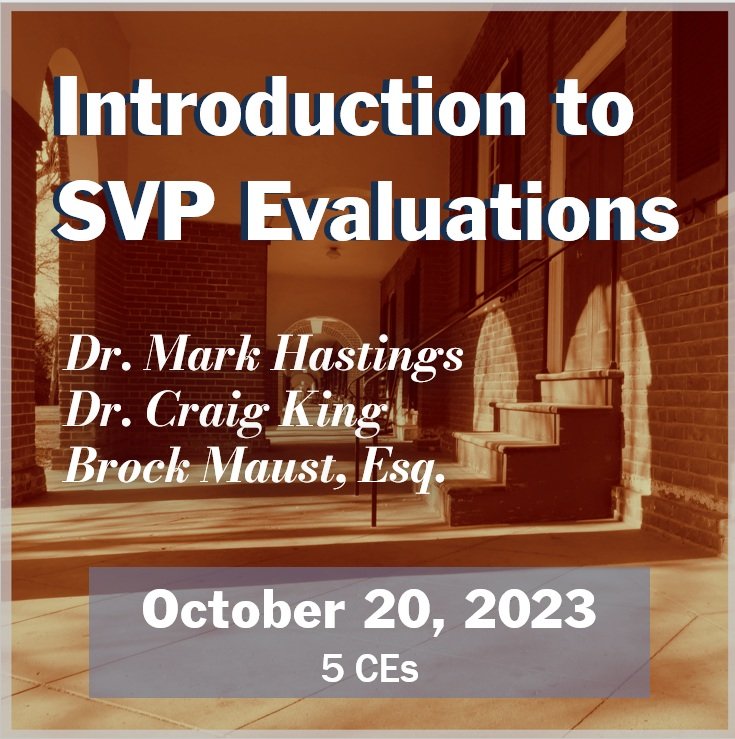
Introduction to Sexually Violent Predator (SVP) Evaluations
Sexually Violent Predator (SVP) evaluations are unique and challenging evaluations that are distinct from other forensic evaluations that may address sexually offending.
In this one-day, live-online (virtual) training, Brock Maust, Esq., will provide a legal introduction to SVP evaluations with an overview of the SVP statute in VA and its relation to other state statutes. Drs. Hastings and King will describe best practices in SVP evaluations, providing crucial information for trainees who want to move from other forensic practice towards this highly specialized niche. Our speakers have extensive experience performing SVP evaluations across state and federal jurisdictions. Participants can earn up to 5 APA-accredited CEUs.
$200 Standard Registration
$100 DBHDS/CSB Employees
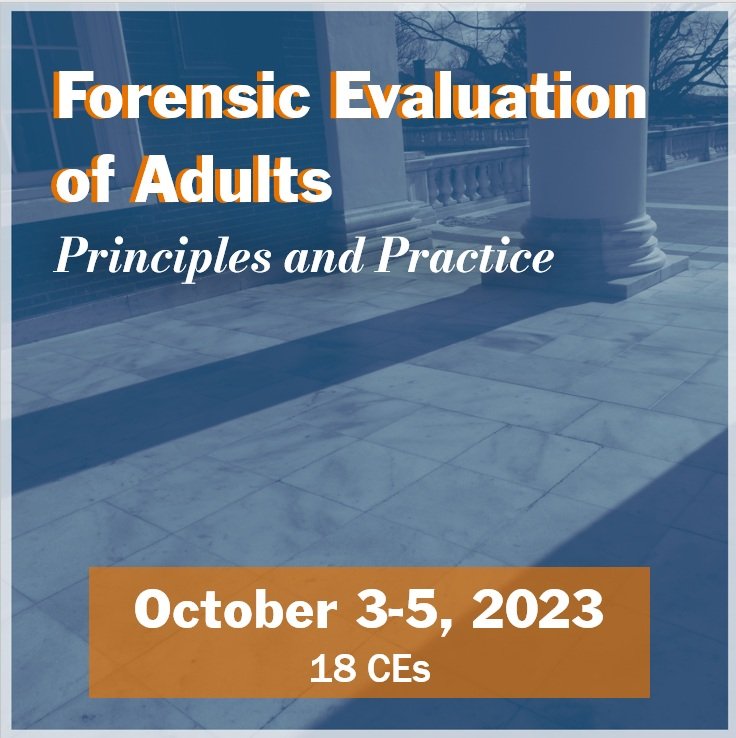
Forensic Evaluation of Adults: Principles and Practice
The ILPPP is conducting its longstanding training on forensic evaluations of adult defendants in a hybrid format. This is a “flipping the classroom” model that combines approximately 12 hours of self-paced online video lectures and quizzes with three days of in-person learning activities at the ILPPP, available before and after the in-person portion. Participants are eligible for up to 18 continuing education units (CEUs) approved by the American Psychological Association (APA). Eligible clinicians who complete this training can be placed on Virginia’s approved list of competency and sanity evaluators.
$1250 Standard Registration
$600 DBHDS/CSB Employees
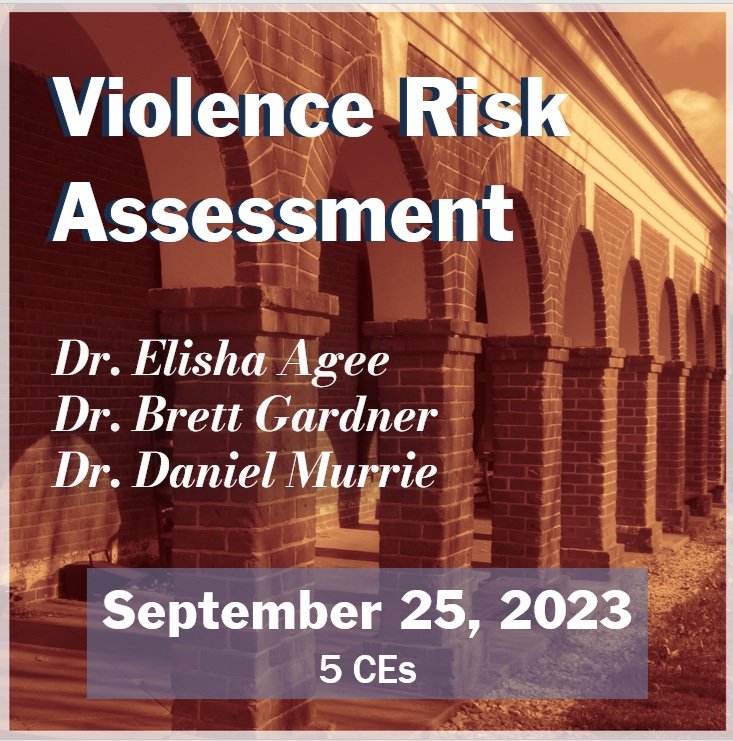
Violence Risk Assessment
Clinicians, particularly in forensic contexts, are often asked to assess violence risk among criminal defendants, psychiatric patients, and others. This one-day, in-person training addresses the conceptual and scientific bases for risk assessment, covering best practice guidelines and relevant research (particularly addressing violence and mental illness). The program also includes an overview of violence risk assessment instruments, followed by an afternoon session including HCR-20 scoring and case conceptualization. Participants will also apply the HCR-20 to a case example. Psychologists can earn up to 5 APA-accredited CEUs.
$250 Standard registration
$100 DBHDS/CSB employees

Improving Competency to Stand Trial Services Amid a National “Competency Crisis”
August 2, 2023: Competence restoration is a form of public mental health treatment ordered by criminal courts. But recently, as more criminal defendants are found incompetent, and ordered to restoration, the public mental health system struggles to meet demands for restoration services. This “competency crisis” requires new approaches. Fortunately, a new evidence base of best practices is emerging. Drs. Gowensmith and Kois are national experts—research and consulting with states around the country to improve competency-related services. Their training will overview the current national crisis, describe emerging best practices for this challenging era, and describe elements of more rigorous restoration services.
Location: UVA School of Law
Speakers include: Neil Gowensmith, PhD (University of Denver) and Lauren Kois, PhD (University of Alabama and University of Virginia)

Principles and Practice of Forensic Evaluation: Adult Defendants
The ILPPP is conducting its longstanding training on forensic evaluations of adult defendants in a hybrid format. This is a “flipping the classroom” model that combines approximately 12 hours of self-paced online video lectures and quizzes with three days of in-person learning activities at the ILPPP, available before and after the in-person portion. Participants are eligible for up to 18 continuing education units (CEUs) approved by the American Psychological Association (APA). Eligible clinicians who complete this training can be placed on Virginia’s approved list of competency and sanity evaluators.
Fees: $1250: Standard registration; $600: DBHDS/CSB employees
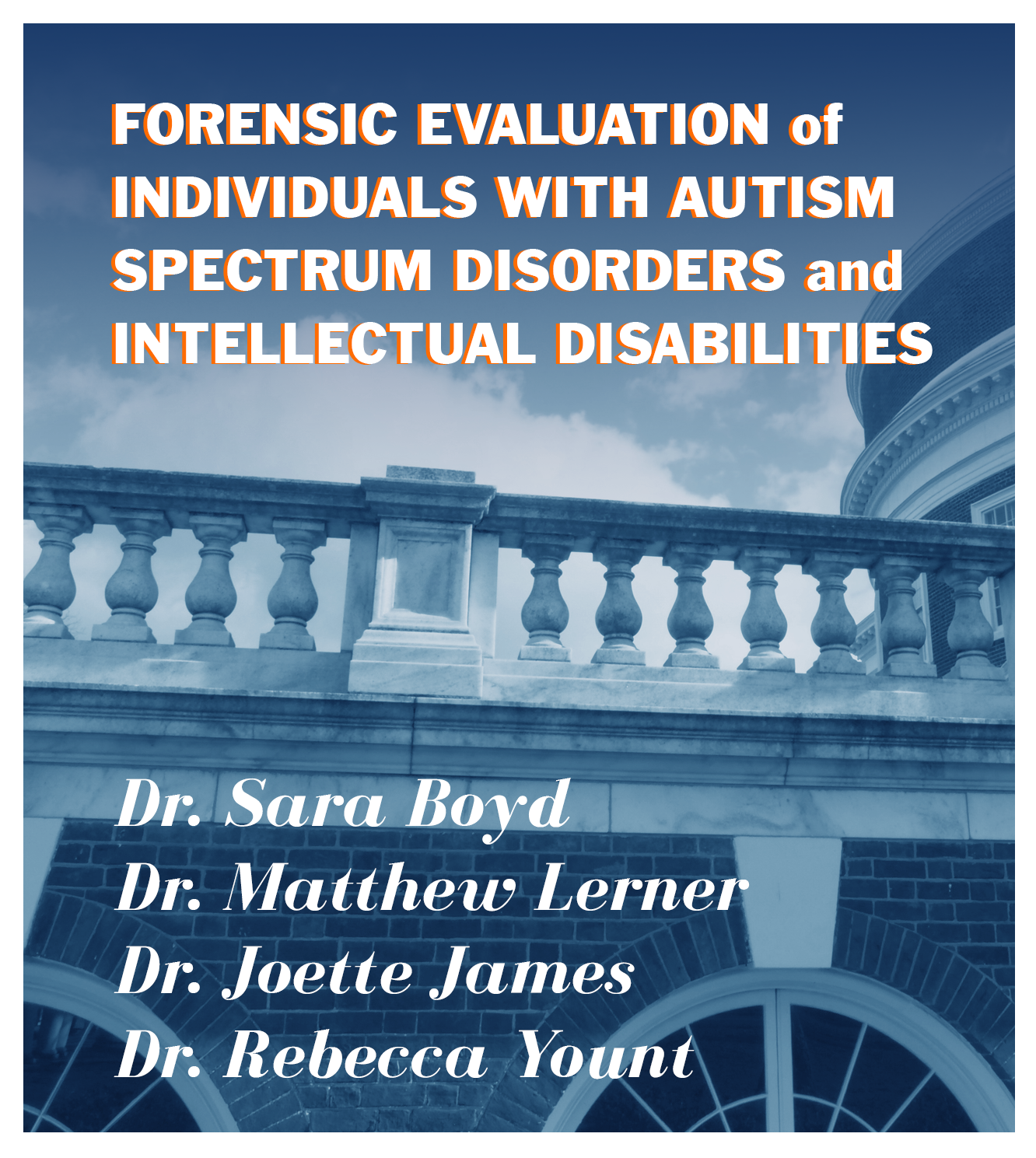
Forensic Evaluation of Individuals with Autism Spectrum Disorders & Intellectual Disabilities
This one-day, live online training brings together experts on forensic evaluation of individuals with autism spectrum disorders (ASD) or intellectual disabilities (ID). This program begins with a comprehensive introduction to how these special populations may come to interact with the criminal legal system, with a particular focus on the potential for reduced criminal responsibility. A clinical neuropsychologist then discusses assessment challenges when investigating ASD/ID in the forensic context. The program concludes with a discussion of the community supports and treatment options available for forensic populations with intellectual and developmental disabilities. While content is broadly applicable, Virginia evaluators may benefit from discussion of the new Virginia statutes §19.2-303.6 and §19.2-271.6 as they apply to defendants with ASD and IDD. Psychologists can earn up to 6 APA-accredited CEUs.
$225 Standard registration
$95 DBHDS/CSB employees

Juvenile Forensic Evaluation: Principles & Practice
New for 2022-2023, the ILPPP is now conducting its longstanding training on forensic evaluations of juveniles in a hybrid format. This is a “flipping the classroom” model that combines approximately 12 hours of self-paced online video lectures and quizzes with close to three days of in-person learning activities at the ILPPP. Participants can earn up to 18 APA-approved CEUs. Eligible clinicians who complete this training can be placed on Virginia’s approved list of juvenile competency evaluators.
$1125 Standard registration
$550 DBHDS/CSB employees

Evaluating Individuals Charged with Sexual Offenses
This two-day, live online (virtual) training provides the foundation necessary for mental health professionals to conduct pre-sentencing evaluation of sexual offenders. After an attorney teaches the legal foundations, a team of psychologists address paraphilias, science underlying risk assessment, clinical and risk assessment, victim grooming behaviors, online behavior among sexual offenders, and the Static-99R risk instrument. Psychologists can earn up to 12 APA-accredited CEUs.
While the scientific and clinical foundations of this training are applicable to all practice areas, this training is designed to provide the “specialized training” required to be appointed as an expert under Virginia §19.2-300, providing a pre-sentencing evaluation of a “person convicted of an offense indicating sexual abnormality.”
$395 Standard registration
$195 DBHDS/CSB employees

